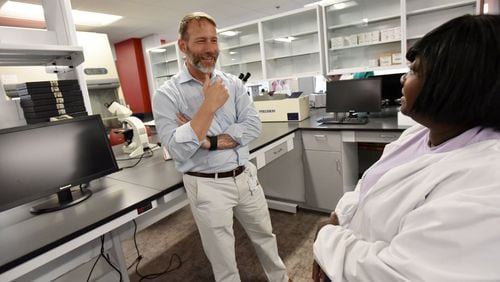The issues that plagued Fulton's health department are by now familiar: a national tuberculosis outbreak, traced to the county. Bungled grant money. An audit that showed a pattern of mismanagement.
Last year, state legislators decided they'd had enough and ordered the county's department to become part of the state health system.
That doesn't become official until July 1, but changes already can be seen.
Before, the county department operated outside of the state’s control, with a Board of Health that held only an advisory role. Now, having been brought under the state’s purview, Fulton County is coordinating more with the state on responses to disease and that money is available to pay for a more robust, better trained staff, officials say.
Additionally, the county has relocated its downtown health services, moving half a mile from the crumbling Aldredge Health Center near Grady Hospital to 10 Park Place, near Georgia State University. The new location has state-of-the-art lab equipment, private rooms for patients and staff to talk over test results and an on-site pharmacy. At Aldredge, the roof leaked and malfunctioning heat or air conditioning often made it uncomfortable for patients to disrobe.
The improved experience for patients even extends to the bathrooms.While the new building has private bathrooms for patients to provide urine samples, those at Aldredge had to use restrooms off the waiting room and bring their samples up in paper bags, recalled David Holland, the chief clinical officer for communicable disease at the reorganized Fulton County Department of Health and Wellness.
The new building is "kind of a metaphor for positive change," said Kathleen Toomey, the district health director for the Fulton Board of Health.
The county’s new board met for the first time Wednesday, but the changes in the way it and the health department operate is already evident, said Brenda Fitzgerald, commissioner of the state department of public health.
There has been a decrease in tuberculosis incidents, with no new cases nationally traced to Fulton County this year. Grady Hospital is now participating in an early brain development program. And the level of communication with the state is drastically improved.
“I really get the sense there’s been significant progress,” Fitzgerald said. “It’s been a truly remarkable transition.”
The new health board has the power to hire and fire the director and set health policy. While Toomey and some of her deputies are now state employees, the rest of the health department workforce is still employed by the county.
Dick Anderson, the Fulton County manager, said the changes “signify a new era” for how the county manages health issues. With more resources available on the day-to-day handling of public health concerns, Toomey and other high-level employees will be able to spend more time planning how to reduce HIV, for example, instead of responding to crises.
“Now, rather than worry about nagging problems, we can be held accountable for more significant outcomes,” Anderson said.
Fulton is now more engaged with statewide issues, like the spread of Zika. That’s important because people coming into Atlanta’s Hartsfield-Jackson Airport can go anywhere in the state, Toomey said. Fulton health employees will receive more training, courtesy of the state, to keep up with the latest science and technology.
“Us being part of a system makes a big difference,” she said. “We need to be working across county lines.”
The effect of the realignment even trickles down to health standards for restaurants.
Now, standards that were different in Fulton County are identical to the rest of the state. Restaurant workers can toss pizza dough glove-free, and dogs are allowed on cafe patios without violating the health code.
There’s also more money at the state to add new employees to handle Fulton’s needs. With close to $1 million in additional funds, Toomey expects to add a deputy director, a district administrator, a director of nursing and a medical epidemiologist, among other employees. None of those positions was funded at the county level.
Toomey also expects the new structure to make Fulton more competitive when it comes to grant funding.
“I see it as a real opportunity all around to strengthen how we do business,” she said. “Sometimes it takes a physical change to make people see things with new eyes. …We’re seeing what it can be.”
MYAJC.COM: REAL JOURNALISM. REAL LOCAL IMPACT.
The AJC's Arielle Kass keeps you updated on the latest happenings in Fulton County government and politics. You'll find more on myAJC.com, including these stories:
Never miss a minute of what's happening in Fulton politics. Subscribe to myAJC.com.
VIDEO -- In other Fulton County news:








